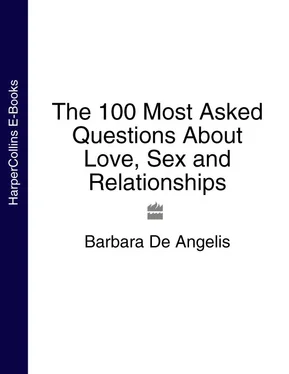This is what I suggest: Without blaming him, and without making him feel like the bad guy, sit down with your husband and share something like the following … “I love you very much, and have tried for ‘X’ years to make this relationship work. I know you’re aware that I’ve been begging you to open up, to work on our marriage, to talk about issues we have. I’ve been doing this for one reason—to try and save our marriage, because I’m not happy with the way things are. You’ve always told me you’re satisfied with this kind of relationship, that you aren’t interested in growing or changing in the way I am, and I haven’t respected what you’ve said, and have tried to get you to change. Now I realize that I was wrong in doing this. You have the right to live just the way you want to, and so do I. My way isn’t better than yours—it’s just different.
“So, honey, I need you to take as much time as you need, days or a few weeks, to ask yourself one last time if you are happy living as the person you are, and do not want a relationship where your partner needs you to open up or work on yourself. If you come to me and tell me this is definitely how you feel, then I will know it’s time for me to go on without you. See, I do want a relationship in which I and my partner are always growing and changing together, and actively working on becoming more intimate and more loving. That is one of the most important things in my life. I would love to have that kind of marriage with you, but if that’s not what you want, I will understand, and free myself to one day find someone who shares my vision of love, and free you to find someone who loves you just the way you are.”
Find the emotional courage to have this conversation with your husband. It will be one of the most difficult yet loving things you’ve ever done, not just for you, but for him. I’ve had people tell me that, after hearing it put this way, their partner miraculously went through a total change and dedicated himself or herself to tremendous personal growth, so it’s possible. Whatever the outcome, know that it’s time to turn the corner in your life, one way or the other, and experience the kind of relationship you’ve always dreamed of.

Compatibility
15 Why am I only attracted to the wrong, “bad boy” type of man, and feel no sexual chemistry with the “nice guys”?
For years I have had a series of very painful, dramatic relationships with men who don’t give me what I need or treat me the way I deserve to be treated. Some cheated, others were very critical, or simply emotionally distant. Finally, I met a really nice guy who is crazy about me. He’s everything I ever wanted—respectful, considerate, and really sweet. But there’s one big thing missing: I don’t feel the sexual chemistry with him that I used to feel with my ex-boyfriends. Lately I’ve been feeling I should break up with him, because I miss that passion and excitement. Help!!

You’ve come to the right place for help—not only is this one of the questions I’m asked most often, but I used to suffer from this same pattern and wonder what was wrong with me. Why did men who didn’t love me the way I wanted to be loved appeal to me so much? Why did I get “bored” in calm, peaceful relationships? Why did the phrase “nice guy” turn off every sexual impulse in my body? It took me years to understand and finally break this unhealthy love habit, but I did it, so I know you can do it too.
Okay, here’s what’s happening. You’ve obviously already figured out that it’s no accident that you happen to attract (or be attracted to) men who, in some way, make you feel unloved, and you’re right … there’s a reason it feels “right” when you’re with a man who withholds his love, and a reason it feels “wrong” when a man gives you all the love you’ve ever wanted. This reason has nothing to do with what your conscious mind tells you about those unloving partners: “You know he is wrong for you. He’s just going to hurt you like the last one. Run in the other direction as fast as you can!!” You may know this is true, but something makes that kind of man so appealing, and that something has to do with your unconscious mind and what I call the “Going Home Syndrome.”
I came up with the phrase “Going Home Syndrome” to describe how our emotional programming ( see Question 12) can cause us to seek out emotional situations that are similar to those we experienced in childhood, regardless of whether those experiences were positive or negative.As human beings, we gravitate toward the familiar. I’ll bet you like to sleep on the same side of the bed each night, park in the same space at work, and go back to your favorite vacation spot. Returning to the familiar is a basic instinct that gives our lives a sense of continuity and safety in a very chaotic and changing universe. Unfortunately, this instinct can work against us when it comes to relationships, in that we may tend to unconsciously seek out emotional situations that are familiar to us.
Here’s how it works: When you were a young child, your home was the main source of love and safety in your life. Even if there was violence or chaos in your household, it was still “home”—it was where you were fed and had a place to sleep and received some sort of attention. So you associate LOVE with HOME. You also associate HOME with other characteristics, based on your experiences at home. For instance, if your parents fought a lot, you might have an equation in your mind that says HOME = CHAOS.If you weren’t shown much love or affection your equation might be HOME = LONELINESS.If one of your parents was abusive, it might be HOME = FEAR.
Remember your basic math from school, where you learned:
If A = B, and B = C, then A = C
Let’s use this same principle to illustrate “Going Home”:
If LOVE = HOME, and HOME = CHAOS, then
LOVE = CHAOS
If LOVE = HOME, and HOME = LONELINESS, then
LOVE = LONELINESS
If LOVE = HOME, and HOME = FEAR, then
LOVE = FEAR.
Your mind will equate whatever associations you have about “home” with what love is supposed to feel like.So if home felt like chaos, you might seek unstable partners who will help you create dramatic, chaotic relationships. If home felt like loneliness, you might seek a partner who doesn’t give you enough love, affection, or attention, so that you end up feeling lonely. If home felt like fear, you might attract someone who always criticizes you, or threatens to leave, or makes you jealous, so that you always feel fearful. You unconsciously choose what is familiar— YOU ARE GOING HOME.
Obviously, we all have positive associations with home as well, which we also seek to reproduce in our adult life. I’ve found, however, that it is the more painful associations that can cause the most trouble, because they are usually unconscious. In other words, if you came from a home where your parents showed you a lot of affection, but criticized one another, you might consciously seek a partner who was very loving, but unconsciously attract someone who was critical.
In your case, your previous partners were probably all “home” to you, possibly because when you grew up, you either watched your mom or dad be mistreated and abandoned by the other parent, or you felt unloved by one of your parents. So for you, it feels comfortable to be uncomfortable with a man! And this explains your present dilemma. You have love, and therefore passion and sexual attraction, associated in your brain with a sense of danger and pain. Of course you don’t “feel” attracted to your “nice guy”—he makes you feel too good!!
Читать дальше














